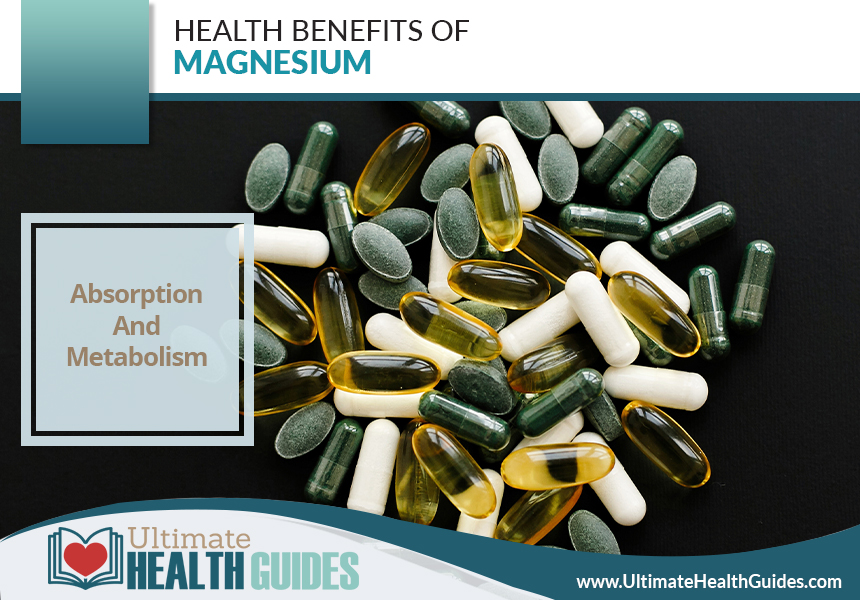Are you trying to find strategies to enhance your well-being and health? A significant element that may boost your general health is magnesium. In addition to helping the body produce energy and contract muscles, it also helps the body absorb calcium and control blood pressure. Magnesium may be a significant component in any comprehensive health plan due to its extensive impact.
This article will examine the many advantages of magnesium as well as any possible negative effects and how it could interact with other drugs. We’ll also go over which foods are rich in magnesium, the quantity to consume daily, and how to make sure that you do. You may take charge of your health and live a more fulfilling life by realizing the significance of this mineral and including it in your diet. So if you’re looking for ways to boost your energy levels, strengthen your bones and muscles, or reduce stress levels, read on to find out why magnesium could be the key!

Definition Of Magnesium
Magnesium is an essential mineral that plays a critical role in physical and mental health. It helps regulate blood pressure, increases energy levels, supports the immune system, and helps with the production of proteins. It also aids in muscle contraction, nerve impulses, and bone development. Magnesium deficiency can lead to a variety of health problems, including fatigue, nausea, appetite loss, anxiety, depression, and irritability.
The human body contains around 25 grams of magnesium. This is primarily found inside cells in organs and tissues, such as the heart, liver, kidneys, and muscles. Magnesium is absorbed from the gastrointestinal tract before being transported through the bloodstream to be used by the different parts of the body.
In order to maintain optimal health levels of magnesium, it is crucial to consume enough through dietary sources or supplements. Good food sources include green leafy vegetables (such as spinach and kale), legumes (like beans), nuts (such as almonds), whole grains, fish, avocados, bananas, dark chocolate, yogurt, seeds (such as pumpkin and squash), and dried fruits (such as prunes and apricots). It’s clear that magnesium plays a vital role in sustaining good health – but where do we get it from?

Sources Of Magnesium
The importance of magnesium for health and wellness has been established, but where does it come from? Magnesium is a mineral found in many different sources. Juxtaposed with the numerous benefits of magnesium, understanding its sources becomes even more crucial.
Foods naturally high in magnesium content are key sources of this vital mineral. Dark green leafy vegetables are especially rich in magnesium, with spinach containing the most at 24 mg per cooked cup. Nuts and seeds also contain significant amounts of magnesium, with pumpkin seeds containing the highest amount at 156 mg per ¼ cup. Whole grains, legumes, and some types of fish are other dietary sources that can provide our bodies with this essential mineral.
Water supplies can also be a source of magnesium, depending on their composition. Hard water (water with higher levels of calcium carbonate) has more dissolved minerals than soft water, including more magnesium. Unfortunately, though, not all municipal water supplies are tested for their mineral content, and some may contain unhealthy levels of heavy metals or pollutants that make them unsafe to consume.
Supplements are another source to consider when trying to increase your intake of this important mineral. Magnesium supplements come in various forms, such as tablets, capsules, powders, and liquid solutions that can be taken orally or applied topically to the skin to help reduce muscle tension and improve skin hydration. It is crucial to note, however, that supplementing with too much magnesium may cause unwanted side effects, such as diarrhea or cramping, so it is best to consult your healthcare practitioner before taking any supplements to ensure that you get the right dosage for your body’s needs. With so many possible sources available for obtaining enough magnesium in your diet and lifestyle, it is vital to understand how the body absorbs and metabolizes this vital nutrient next – an area that will be explored further in the upcoming section.

Absorption And Metabolism
Magnesium is an essential mineral for human health, and it is absorbed through the gastrointestinal tract. Most of the magnesium that is consumed enters the bloodstream and is transported to tissues and cells throughout the body. The absorption rate of magnesium can vary greatly depending on various factors, such as age, diet, and medical conditions. For example, older adults tend to absorb less magnesium than younger adults due to decreased gastrointestinal motility. Additionally, certain medications can also affect how much magnesium is absorbed by a person’s body.
Individuals with a low-magnesium diet are at risk of not getting sufficient magnesium from their diet alone. Supplemental forms of magnesium, such as capsules or tablets, can be used to increase intake levels. These can provide additional benefits for those who are deficient in this vital nutrient.
The metabolism of magnesium is tightly regulated within the body in order to maintain adequate levels. The kidneys play a major role in maintaining proper magnesium levels by controlling how much is excreted in the urine. This process helps regulate how much magnesium reaches various organs throughout the body and prevents too much from being lost through urination. With this regulation, individuals can obtain all the benefits that come with proper levels of this important mineral. The role that magnesium plays in the body is complex and far-reaching, as it affects many aspects of health, ranging from muscle contraction to energy production.

Role In The Body
A great example of the power of magnesium is a case study of a patient who was suffering from chronic muscle cramps. After a few weeks, the patient’s symptoms improved with consistent supplementation and dietary modifications. Magnesium plays a significant role in the body, contributing to the conversion of food into energy and maintaining strong bones and teeth, among other functions. It aids in blood pressure, blood sugar, and hormone regulation.
Magnesium is also vital for several metabolic activities, including muscular contraction, protein synthesis, and DNA synthesis. Several of these functions would not be feasible without them. Lack of magnesium may cause weariness and sleeplessness, compromised immune system functioning, and an elevated risk of cardiovascular disease. Ensuring that you get sufficient magnesium via your diet or dietary supplements is crucial for this reason. Eating leafy green vegetables and legumes can help you get the daily recommended amount of magnesium each day.
Adequate levels of magnesium are also essential for optimal physical performance. Studies have found that athletes who are supplemented with magnesium experience improved strength and endurance during their workouts as well as quicker recovery times afterward. This suggests that supplementing with magnesium can help improve overall athletic performance while also protecting against injuries caused by strenuous exercise. These benefits demonstrate why it is so crucial to ensure that we are getting sufficient magnesium through our diets or supplementation when necessary. Moving forward, we will explore how magnesium can benefit cardiovascular health.

对心血管健康的益处
Cardiovascular health is a critical component of overall well-being. Magnesium plays a significant role in keeping the heart and blood vessels healthy. The mineral helps regulate blood pressure, reduce inflammation, and prevent blood clots that can lead to heart attacks or strokes. It also helps maintain a healthy rhythm for the cardiac muscle’s contractions.
Adequate magnesium levels have been linked to reduced risk of coronary artery disease, hypertension, and stroke. Studies have shown that people who consume more magnesium have lower rates of these conditions than those who don’t get enough of the mineral. People with high levels of magnesium in their diet are also less likely to suffer from sudden cardiac death or abnormal heart rhythms.
The mineral may also help reduce cholesterol levels and triglycerides, both of which are significant for cardiovascular health. Magnesium helps regulate the body’s production of “bad” LDL cholesterol while promoting higher levels of “good” HDL cholesterol. This can reduce the risk of atherosclerosis, which is a buildup of fatty deposits in the arteries. Finally, studies suggest that supplementing with magnesium can improve exercise performance by increasing endurance, reducing fatigue, and improving oxygen uptake during physical activity. All these properties make it an essential nutrient for anyone looking to maintain good cardiovascular health.

Bone Health Benefits
It is commonly believed that magnesium plays a critical role in bone health, but just how much of a contribution does it make? Recent studies suggest that magnesium may be critical for maintaining healthy bones. It’s believed to help regulate the body’s absorption of calcium and other minerals, which are vital for strong bones.
Magnesium has been found to reduce the risk of osteoporosis, improve bone density, and reduce fracture risk. Research suggests that it helps the body absorb calcium more efficiently and aids in the formation of collagen, a protein that gives the bones their structure. Additionally, it has been found to increase vitamin D levels, which helps in the proper absorption of calcium.
Studies have also shown that magnesium can help reduce inflammation in the muscles and joints, which can be beneficial for overall bone health. This could be because magnesium helps relax muscle spasms and improve circulation throughout the body. Improved circulation means more oxygen-rich blood can reach the bones, helping them stay strong and healthy.
Finally, research indicates that a higher intake of dietary magnesium is associated with lower levels of biomarkers associated with bone turnovers, such as C-terminal telopeptide (CTX) and N-terminal telopeptide (NTX). This suggests that adequate consumption of magnesium may help support sustained bone health over time. With these findings in mind, it’s clear why magnesium is an important mineral for bone health – now, let’s look at how it might support your immune system.

支持免疫系统
Magnesium plays a critical role in immune system health. It helps reduce inflammation, which is one of the body’s primary responses to injury and infection. Research shows that magnesium supplementation can help boost the immune system’s ability to fight off illness and disease.
Magnesium has also been found to have beneficial effects on the production of cytokines, which are proteins released by cells in response to foreign substances like viruses. By helping regulate cytokine production, magnesium can help protect against infection and reduce inflammation. In addition, magnesium is essential for the production of antibodies, which are molecules produced by the immune system that recognize and attack invading organisms or toxins. Magnesium helps maintain healthy levels of antibodies in the body, thus helping keep us safe from disease and infection.
Finally, magnesium helps support healthy levels of white blood cells, which are responsible for fighting infections. Studies have shown that magnesium supplementation can increase white blood cell count, thus boosting overall immunity. This increased immunity may help protect against various illnesses and diseases. Now, we transition into the next section about stress reduction; it’s important to note that stress can weaken our immune systems as well as our physical and mental well-being — which is why it’s so important to find ways to manage it effectively.

Stress And Anxiety Reduction
Magnesium has long been known to reduce stress. Studies have found that it can help calm the nervous system, which leads to a decrease in cortisol levels. This can lead to better sleep and improved mental health.
Studies have also shown that magnesium can help regulate emotions, such as anger and anxiety. It has been found to be an effective supplement for those with depression or anxiety disorders. Furthermore, magnesium can aid in improving one’s mood and reducing stress-related fatigue.
The mineral has also been linked to increased relaxation and lowered blood pressure. Research suggests that it may also reduce tension headaches caused by stress. A study conducted by the University of California revealed that magnesium supplementation improved psychological symptoms in participants who experienced severe stress due to traumatic events.
A recent review of studies concluded that magnesium is effective in reducing stress and improving mental health outcomes for those experiencing high levels of stress or anxiety. It noted that further research is needed to confirm the effects of magnesium on mood regulation, but current evidence suggests that it may be beneficial for those struggling with stress-related issues. We will now transition into the topic of mood regulation; it is important to consider how magnesium affects our emotional well-being.

Mood Regulation And Control
Magnesium has been known to play a vital role in mood regulation. Research shows that it can help with feelings of anxiety and depression. It can also help reduce stress levels.
| 益处 | Effects | 资料来源 |
|---|---|---|
| Improved mood | Reduced stress levels | Oral supplements, diet |
| Anxiety relief | Depression treatment | Topical oils, baths |
| Improved concentration | Increased energy levels | Injections or IVs |
The mineral helps regulate neurotransmitter levels in the brain, which are responsible for emotions and behaviors. It boosts serotonin production, which improves overall mood and helps reduce anxiety. Additionally, magnesium can lead to better concentration and increased energy levels.
The ways to get magnesium would vary depending on the individual’s needs. Oral supplements are great for those wanting a daily dose of the mineral; however, if looking for more immediate effects, topical oils or baths may be beneficial. For those needing larger doses quickly, injections or IVs may be necessary.
Overall, magnesium provides numerous benefits that can help improve mental health and regulate emotions. It is important to do your research and consult with a trusted professional before starting a new supplement. With the right dosage of magnesium and proper guidance from a medical professional, individuals can experience an improved sense of well-being and peace of mind. Next, we will transition into sleep quality improvement; research indicates that taking regular doses of magnesium can also improve sleep quality by decreasing cortisol levels in the body, which causes stress-induced insomnia.

Sleep Quality Improvement
A study of 741 men and women from the United Kingdom suggests that a lack of magnesium can lead to poor sleep quality. In this case study, those who had lower magnesium levels reported having more difficulty falling asleep and staying asleep than those with higher levels. Magnesium is known to have a calming effect on the body and helps regulate melatonin levels, which can improve sleep quality. Here are five ways magnesium can help improve your sleep.
- Magnesium helps relax the muscles, allowing for better circulation and less physical stress.
- Magnesium helps balance cortisol levels, reducing feelings of stress or anxiety that could interfere with a restful night’s sleep.
- Magnesium assists in regulating hormones like serotonin and dopamine, which can promote healthy sleep patterns.
- Magnesium aids in balancing blood sugar levels, which can decrease the chance of waking during the night due to hunger or low energy levels.
- Magnesium can help reduce nighttime leg cramps and restless legs syndrome symptoms, allowing for uninterrupted restorative sleep.
When it comes to improving sleep quality, there may be no better mineral than magnesium. Adding foods high in magnesium, like almonds, spinach, pumpkin seeds, and dark chocolate, to your diet can help ensure that you get the recommended daily intake — 300–400 mg — needed to reap all its health benefits. With proper amounts of magnesium in your system, you’ll be well on your way to improved physical performance, both mentally and physically.

Improved Physical Performance
In addition to improved sleep quality, magnesium has also been linked to improved physical performance. This is due to its ability to reduce muscle fatigue and improve energy production in the body. Magnesium helps increase the efficiency of ATP (adenosine triphosphate) production – the energy currency of cells – as well as maintain healthy muscle contractions during exercise.
| 益处 | Health Conditions | 建议用量 |
|---|---|---|
| Reduces muscle matigue & improves energy production | Exercise performance | 400-500 mg daily |
| Boosts muscular strength & endurance | Athletic performance | 500-600 mg daily for athletes |
| Helps increase oxygen uptake capacity | Cardiovascular health & exercise recovery | 200-400 mg daily for adults |
Studies have shown that magnesium supplementation can help boost muscular strength and endurance. It has been found to increase oxygen uptake capacity, which can help improve cardiovascular health and exercise recovery. Furthermore, magnesium can help reduce inflammation associated with intense physical activity, which, in turn, can reduce muscle soreness after a workout.
In terms of the recommended dosage, it is suggested that adults consume 200-400 mg of magnesium per day for general health benefits, while athletes may need up to 500-600 mg. However, the exact amount needed may vary depending on individual needs and lifestyle habits. It’s important to talk with a healthcare professional before taking any kind of supplementation. Now that we’ve explored the potential health benefits of magnesium related to improved sleep quality and physical performance, we will take a look at how it might be beneficial in managing diabetes.

Management Of Diabetes
For those with diabetes, magnesium acts as a magic wand, assisting in controlling blood sugar levels and lowering insulin resistance. It is a significant ingredient that aids in controlling how much glucose is absorbed and how much insulin and other hormones are produced. According to studies, magnesium may enhance the body’s reaction to insulin, assisting in the maintenance of stable blood sugar levels.
Magnesium supplements may lower hemoglobin A1c (HbA1c) levels in persons with Type 2 diabetes. This crucial indicator assesses how well you have managed your blood sugar on average over the last three months. Daily supplementation with magnesium has been shown to lower HbA1c by up to 0.4%. It may also lower fasting glucose levels by as much as ten percent.
Magnesium supplements may also be advantageous for those with Type 1 diabetes. It has been shown to decrease both the frequency and severity of hypoglycemic episodes. As such, regularly taking magnesium supplements could help individuals better balance their blood sugar levels and maintain steady energy throughout the day.
Magnesium plays a critical role in managing diabetes by helping regulate glucose absorption and the production of hormones related to insulin sensitivity. Supplementation can improve overall glycemic control in those with Type 1 or Type 2 diabetes by reducing HbA1c levels and the frequency of hypoglycemic episodes. Moving forward, we will consider how magnesium interacts with other nutrients in order to gain optimal health benefits from this essential mineral, as this is essential.

Nutrient Interactions And Benefits
<
p align=”justify”>
Moving on from the topic of diabetes management, let’s explore the health benefits of magnesium. Magnesium is an essential mineral found in many foods and is involved in hundreds of biochemical reactions throughout the body. It helps regulate nerve and muscle function and blood sugar levels, supports immune system health, and plays a role in protein synthesis.
The most significant benefit of magnesium is its ability to reduce inflammation. In particular, it has been shown to help lower levels of C-reactive protein (CRP), which is produced in response to inflammation in the body. Additionally, magnesium helps regulate blood pressure by helping relax blood vessels and by increasing their diameter, which can help reduce stress on the cardiovascular system.
Magnesium also plays a critical role in bone health by helping absorb calcium and other minerals that are needed for healthy bones. Studies have shown that people with higher levels of magnesium tend to have stronger bones than those with lower levels. Furthermore, research has indicated that magnesium may help protect against age-related cognitive decline, as it helps support neuron function and neurotransmitter release.
Finally, magnesium can help improve sleep quality by promoting relaxation, which can lead to better overall physical and mental well-being. Magnesium also helps promote feelings of calmness and relaxation during times of stress, which can be beneficial for overall mood regulation. Understanding nutrient interactions between different vitamins and minerals is key to maintaining optimal health and well-being. For instance, it’s important to note that vitamin D needs magnesium for proper absorption into the body, so getting adequate amounts of both is critical for good health outcomes. Knowing recommended daily intake levels for each nutrient will help ensure that you are getting enough nutrients for your individual needs.

Recommended Daily Intake
Maintaining adequate levels of magnesium is critical for optimal health and well-being; knowing the recommended daily intake (RDI) of this vital mineral is the crucial first step in achieving this goal. The RDI for magnesium depends on a person’s age, sex, as well as other factors, such as pregnancy or breastfeeding. The current RDI for adults aged 19-30 years is 400 milligrams per day for men and 310 milligrams per day for women. For older adults aged 31 years and above, the RDI increases to 420 milligrams per day for men and 320 milligrams per day for women. Pregnant and breastfeeding women have a slightly higher RDI of 350-360 milligrams per day.
It’s important to note that while the RDI should be sufficient to prevent deficiency symptoms, many experts believe that higher intakes may be beneficial in certain cases. For instance, athletes may require additional magnesium due to increased physical activity, or those with certain chronic health conditions may need additional amounts to reduce symptoms. It’s always best to consult a healthcare professional before increasing your intake beyond the recommended amount.
There are many different ways to meet your daily magnesium needs, from eating foods high in magnesium, such as leafy greens, nuts, seeds, and legumes, to taking supplements. Taking into account all these options will help ensure that you reach your individual goals when it comes to getting the right amount of this essential mineral each day. With an understanding of how much magnesium we need each day, we can now look at potential side effects associated with high intakes of this mineral.

潜在的副作用
Although magnesium is generally safe to take, it could potentially have side effects. Taking too much of the mineral or taking it considering the risks can cause adverse reactions. The most common side effects are diarrhea and nausea. These occur when people take more than 350 milligrams per day. Taking this amount may also result in abdominal cramping, an irregular heartbeat, or, even worse, low blood pressure.
For those with kidney problems or heart disease, taking magnesium can be risky because the kidneys may not be able to process the mineral properly. People with these conditions should consult their doctor before taking any supplements. In rare cases, magnesium toxicity can occur if large doses are taken over a long period of time. Symptoms of toxicity include confusion, muscle weakness, and difficulty breathing. If you experience any of these symptoms while taking magnesium supplements, you should stop taking them immediately and seek medical attention.

常见问题
How Much Magnesium Should You Take Per Day?
When it comes to magnesium, it’s important to know how much is the right amount for you. The amount of magnesium you should take per day depends on your age, gender, and other factors. Taking too much or too little can have serious consequences for your health. To understand the optimal daily dosage of magnesium, let’s look at what we know about this essential mineral.
Magnesium is a mineral found naturally in many foods and supplements. It plays a critical role in the body, helping regulate the nerves, muscles, and blood sugar levels. Magnesium also helps with energy production and the absorption of other vitamins and minerals. It’s even been linked to improved heart health, better sleep quality, and increased cognitive performance.
Most people get enough magnesium from their diets. However, some people may need to supplement with additional magnesium if they’re deficient in it. People who are at risk of being low on magnesium include those who have diabetes or kidney problems, pregnant women, or anyone with malabsorption issues, such as Crohn’s disease or celiac disease.
How much magnesium you need a day is based on your individual needs and lifestyle habits. Dosages and specific supplements may be best depending on your age, gender, and any underlying medical conditions you may have. For most people, though, eating a healthy diet that includes plenty of dark leafy greens, nuts, and seeds will provide enough of this essential nutrient.
To ensure that you’re getting adequate amounts of magnesium each day, make sure to talk to your doctor about your dietary habits and whether supplementation is necessary for you personally. It’s also important to monitor any changes in your symptoms, such as fatigue or muscle cramps. These can indicate a deficiency in this vital mineral.
Are There Any Long-Term Health Risks Associated With Taking Magnesium?
When supplementing with magnesium, it is important to consider the long-term health risks associated with taking it. While magnesium is an essential nutrient that can be beneficial for overall health and wellness, there are possible risks if too much is taken. It is important to note that magnesium toxicity from dietary supplements is rare and usually only occurs when very large doses are consumed. However, there are some side effects that have been reported from excessive consumption of magnesium supplements, like the ones listed below.
- 腹泻
- Stomach Cramps
- 恶心
- Muscle Weakness
In some cases, chronic use of high doses of magnesium could also lead to more serious issues, such as low blood pressure and irregular heartbeat. It is best to research how much magnesium is best for you and not exceed that healthy amount to avoid these potential risks. Additionally, people with certain medical conditions should not take magnesium without consulting a trusted healthcare professional first. For example, those with kidney disease or other conditions that affect how their body absorbs minerals may need to limit their intake or avoid taking it altogether. It is also important to note that certain medications can interact with magnesium supplements.
It’s always best to check with your healthcare provider before taking any new supplement. Therefore, although the health benefits of magnesium may be numerous and well documented, caution must still be taken when considering its use as a supplement due to the possible long-term health risks associated with its consumption in excess amounts. Anybody considering taking a magnesium supplement is encouraged to see their physician first for guidance on dose and possible interactions.
What Kind Of Magnesium Supplement Is Best To Take?
What form is best to take a magnesium supplement in is one of the most crucial issues to think about. It might be challenging to choose which kind would be best for you, given the variety of options. Here are some recommendations on how to choose the top magnesium supplement to help you make an educated decision.
- While choosing a magnesium supplement, take into account your unique requirements. It’s important to choose a magnesium supplement that fits your specific requirements since different forms of the mineral may have different degrees of absorption and bioavailability.
- Discuss with your doctor the possible advantages of each kind of magnesium supplement and how they could apply to you specifically. This will enable you to make an educated decision about which type is most appropriate for your health needs and lifestyle.
- Research the quality and purity standards of the product before purchasing it. Make sure that the source and type of magnesium used in the supplement have been researched and tested for safety and efficacy by an independent third-party organization.
Choosing the best form of magnesium supplement can be overwhelming. But with some research and guidance from your healthcare provider, you can find one that meets your individual needs and provides optimal health benefits for long-term use. Remember to always read labels carefully before purchasing any dietary supplements, as quality matters when it comes to achieving maximum results from supplementation!
What Foods Are High In Magnesium?
Asking what foods are high in magnesium is a significant question for those looking to supplement their dietary intake of this essential mineral. While magnesium supplements are a great way to boost your daily intake, it’s also beneficial to incorporate natural sources of the mineral into your diet. The good news is that there are many delicious and nutritious foods out there that contain magnesium.
To begin with, some of the best sources of dietary magnesium come from leafy greens, such as spinach and Swiss chard. Not only are these nutrient-dense vegetables packed with vitamins and minerals, but they also contain high levels of magnesium – up to 39% of the recommended daily value in just one cup! Other green vegetables, such as broccoli, kale, and Brussels sprouts, provide a good source, too.
If you’re looking for plant-based sources of magnesium, nuts and seeds can be a great addition to your diet. Wide varieties, such as almonds, cashews, pumpkin seeds, sesame seeds, and flaxseeds, provide around 20% or more of the recommended daily value in just a quarter-cup serving! For those who enjoy dairy products, yogurt and milk can be great sources as well.
Not only do these food items provide plenty of dietary benefits, but they also taste delicious! Incorporating them into meals or snacks is an easy way to get more magnesium into your diet without having to take additional supplements. So if you’re looking for natural ways to increase your intake of this essential mineral, then make sure that you include these foods in your meal plan today!
Does Magnesium Interact With Any Other Medications Or Supplements?
It is commonly recognized that magnesium is a necessary element that supports a number of body processes. But less is known about how it interacts with other drugs or dietary supplements. The possible interactions between magnesium and other substances, as well as the hazards of taking them together, is significant knowledge to have before you start changing your diet.
Let’s start by examining how magnesium interacts with other drugs or dietary supplements. There are certain interactions between magnesium and specific medications or dietary supplements, such as calcium and vitamin D, according to studies. Together, these compounds have the ability to either speed up or slow down the body’s absorption of magnesium. Magnesium may also interact in a number of ways with certain antibiotics, blood pressure medicines, and muscle relaxants.
The possible negative effects should be taken into account when examining how magnesium interacts with other prescription drugs or dietary supplements. A physiological imbalance brought on by taking too much of one chemical may result in uncomfortable side effects, including headaches, nausea, diarrhea, dizziness, and more. Also, before incorporating any new supplement into your regimen, it’s crucial to discuss potential drug interactions with your doctor if you’re currently taking any kind of prescription for a pre-existing ailment or sickness.
In terms of the benefits of taking a combination of drugs or supplements containing magnesium, studies have shown that such combinations can help reduce inflammation in the body, which can be beneficial for conditions like arthritis and chronic pain. Additionally, combining certain medications and supplements may also improve sleep quality and reduce anxiety levels, which could have positive long-term health implications. Ultimately, though, it’s important to keep in mind that each individual is unique, so always consult your healthcare provider before making any changes to your diet or supplement routine.
Given its wide range of benefits for overall health and wellness, it’s no wonder why people are increasingly turning toward supplementation with magnesium-containing products. However, due to potential interactions between different forms of drugs or supplements containing this mineral, it’s crucial to speak with a trusted professional beforehand. Only then can you make an informed decision on whether such combinations are suitable for you personally based on your medical history and current state of health.

结论
To conclude, magnesium is a valuable mineral that offers countless health benefits. It’s important to make sure that you’re getting enough of it in your diet and supplementing if needed. The recommended daily intake of magnesium is 400 mg for men and 310 mg for women; however, it’s best to consult with your doctor or nutritionist to determine the right dosage for you.
<
p align=”justify”>If you decide to take a magnesium supplement, be sure to choose one that’s right for your needs. There are many forms available, so do some research before making your selection. Lastly, consider adding foods high in magnesium, such as nuts, seeds, legumes, and dark leafy greens, into your diet. In short, taking the proper amount of magnesium can provide numerous health benefits and help protect against long-term risks. So don’t forget about this essential mineral!














